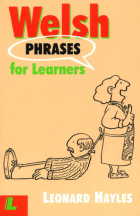
Welsh Phrases for Learners
Hayles, Leonard (1997) Welsh Phrases for Learners. Talybont: Y Lolfa, ISBN 0-86243-364-9, 200pp, illus., £5.95 p/b.

‘A dictionary of Welsh phrases and idioms in everyday use, specially compiled for the learner; with illustrative cartoons’
PUBLISHER’S BLURB: ‘You can learn a language from a grammar book, but still not be able to speak or write it – because you haven’t those idioms and figures of speech that the every native speaker seems to be born with. This book overcomes the problem. It lists thousands of those handy little phrases with their meanings. You can browse through them to improve your Welsh, or you can look them up when you need to understand them. The author, Leonard Hayles, is himself a Welsh learner and has compiled this book with his fellow learners in mind.’
ASSESSMENT: This ought to be a very useful book. All those handy little phrases that you can’t find in your dictionary, you pick up in Welsh lessons from a real Welsh teacher, and here is the result of many years’ Welsh classes. Unfortunately, what made sense in context is here presented in the abstract, where it sometimes loses its point. No thought has been given to how to present the material: phrases are just crudely alphabetised by the first element, so that, for example, at full speed and at high speed and at speed are translated without reference to each other and scattered among other phrases beginning with ‘at’. Meanwhile, at the time ends up next to at the time (when/that), but with an inexplicably different translation. Not surprising, if these are the relics of completely different Welsh lessons, but not helpful either. English–Welsh phrases are sometimes just a reversal of Welsh–English, with nothing to show when the translation is more specific than you might realise, or to warn about its tone: artificial insemination is (back-)translated as tarw potel (‘bottled bull’), a jocular agricultural expression that would hardly be appropriate in a discussion of medical ethics! To find a stylish way of saying that someone is very happy, you have to ignore happy and look under as, where you will find the quaint expressions as happy as a cuckoo and as happy as a trout – which, since they don’t exist in English, you couldn’t have known to look for. And some ‘phrases’ consist of one word that you would (hope to) find in even the worst dictionary (e.g. headache, previously; popeth, nesnes). As so often with this sort of book, there is useful stuff in there if you care to dredge for it, perhaps browsing through page by page highlighting or collecting the good bits; but if there had been some kind of proper filtering and organising process this book could have been far more useful.
Language books from Y Lolfa: http://www.ylolfa.com/catalogue/language-tutors.htm
About the author: http://www.ylolfa.com/awduron/leonard-hayles.html
© 1999–2001 Harry Campbell
Page added: ?November 1999